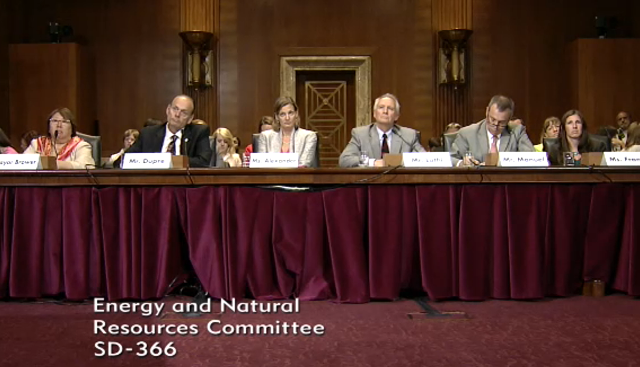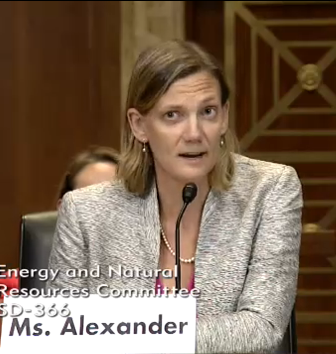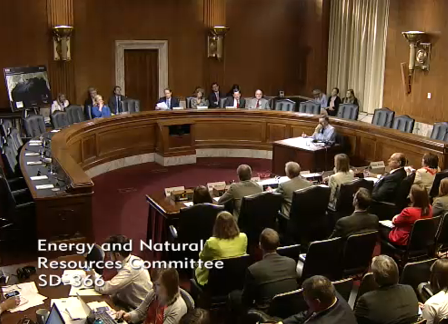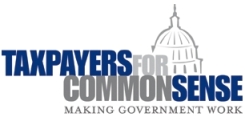Today, TCS President Ryan Alexander testified before the Senate Energy and Natural Resources Committee on proposed state-federal revenue sharing alterations within S. 1273, the FAIR Act of 2013.
For images of the hearing, click here.
|
Ms. Ryan Alexander
Testimony submitted to the Legislative hearing on S. 1273, the “FAIR Act of 2013” July 23, 2013 Good afternoon Chairman Wyden, Ranking Member Murkowski, and distinguished members of the Committee. Thank you for the opportunity to testify today on the FAIR Act, S. 1273. My name is Ryan Alexander, and I am President of Taxpayers for Common Sense (TCS), a national, non-partisan budget watchdog organization. The mission of Taxpayers for Common Sense is to achieve a government that spends taxpayer dollars responsibly and operates within its means. Over the last 17 years, TCS has worked actively to ensure that taxpayers receive a fair return on resources extracted from federal lands and waters. Royalties and fees collected from resource development represent a significant source of income for the federal government and must be collected, managed and accounted for in a fair and accurate manner. As the rightful owners, taxpayers are entitled to fair market compensation for the resources extracted from our lands and waters, just like any private landowner. Unfortunately, over the years taxpayers have lost billions of dollars on royalty-free oil and gas leases and royalty-free hard rock mineral operations on federal lands. Outdated laws and an inadequate and sometimes corrupt royalty collection system have also cost us billions. In today’s budget climate of across-the-board budget cuts, we cannot afford to lose this valuable revenue. These problems must be resolved as we move forward with additional mining and energy production on federal lands and waters. Today’s hearing to examine legislation regarding energy revenues in federal waters certainly raises important issues. But increasing the state revenue shares for energy development, as the “FAIR Act” proposes, would siphon valuable revenue from the federal coffers for decades to come. As currently drafted, the bill has no offset and we expect its score against the federal budget will show significant cost to the taxpayer. At a time when we should be discussing how to bring in more revenue – not less – to the federal Treasury, this policy would not only be costly, but also dangerously short-sighted. Energy Legislation Must Ensure Fair and Accurate Collection of Revenues for Extraction of our Federally-Owned Resources Natural resources derived from federal lands and waters can and do provide great benefit to the entire nation. In addition to their end use and overall domestic economic benefit, their extraction provides valuable revenue to federal coffers, with the potential to provide much more. To this end, federal lands and waters must be mined, drilled or otherwise developed in a manner that protects taxpayers’ interests, first and foremost. Appropriate fees, rents and royalties must be collected and long-term liabilities such as potential clean-up or mitigation costs must be shouldered by the extractive industries, not by taxpayers. While federally owned natural resources currently provide around $10 billion annually to the Treasury, this amount falls dramatically short of what is rightfully owed to the federal Treasury. For example, taxpayers are currently losing billions of dollars on royalty-free oil and gas leases in the Gulf of Mexico, as well as royalty-free operations for hard rock mineral extraction on federal lands. We must fix these problems so that we can recoup what we are owed. TCS is not opposed to offshore drilling in federal waters. But additional federal resources derived from new drilling must go to federal taxpayers, the rightful owners of those resources. We believe with proper taxpayer safeguards and the application of fair market royalties, federal resources can and must be used to meet our nation’s energy, transportation, and mineral needs. Determining whether it is in the national interest to drill should include an evaluation of offshore resources and potential income, and also potential long-term liabilities. Taxpayers for Common Sense is opposed to any legislative measure that would allow states to receive a greater percentage of oil and gas revenues than is allowed under existing federal-state revenue-sharing provisions for royalty payments. We oppose any measure to direct any additional percentage of royalties collected on new leases in federal waters to the states. Further, we would like to see the revenue-sharing provisions of the Gulf of Mexico Energy Security Act (GOMESA) repealed and the original federal/state shares reinstated. Revenues from traditionally defined federal waters must be directed to the federal Treasury. Current Federal Royalty Revenue Already Falls Short TCS believes there are many areas where reform is needed to ensure fair and accurate royalty collection. Many of these changes will help both the federal government and the states acquire more revenue from federal energy leases. To begin, the federal government must have a clear, transparent collection system that has sufficient oversight and accountability. The many scandals that plagued the Minerals Management Service (MMS), the agency that for nearly three decades ran the government’s royalty collection system, demonstrated how corrupted the system can become. For years the Government Accountability Office (GAO) has found that the Department of Interior has not done enough to monitor and evaluate its royalty collections. GAO has included royalty collection in its last two reports on high-risk federal programs and activities. A report in 2008 found that the DOI had not reviewed how it was compensated for extracted oil and gas from public lands for more than 25 years and had no system in place to even determine whether or not such a reassessment was needed. A 2010 study found that DOI had no way to determine if it was accurately measuring the amount of resources taken from public lands, making it unlikely the federal government is being fairly compensated. On top of these collection issues, the U.S. has some of the lowest underlying royalty rates in the world. Second, no lease should be able to operate royalty-free. Leases issued under the Deepwater Royalty Relief Act of 1996 are currently required to pay no royalty. Congress should not give away publicly owned assets. Taxpayers are losing billions on these leases and will lose far more when many of these idle tracts begin production. Several options have been proposed in the House and Senate to address this issue, but none have been enacted into law. Finally, other reforms to existing onshore oil and gas operations could also provide more valuable revenue for taxpayers. In 2010, GAO found that taxpayers would receive $23 million more in royalty revenue annually from additional natural gas obtained from federal lands, if companies were required to capture vented or flared natural gas in cases where it is economically feasible. Although some progress has been made to fix the system since the dismantling of MMS in 2010, the Department of Interior’s new royalty management structure is still a work-in-progress. Since royalty collection has remained on the GAO’s high-risk list, despite the new system at DOI under the Office of Natural Resources Revenue, it is clear the agency still has work to do in this area. State Revenue-Sharing Changes Proposed in FAIR Act At the same time that federal taxpayers are already losing valuable royalty revenue, the FAIR Act proposes siphoning more money from our federally owned oil and gas resources. The Gulf of Mexico Energy Security Act already directs a portion of revenue derived from new leases in federal waters in the Gulf of Mexico to the states rather than to federal taxpayers. Since 2006, this law has cost taxpayers more than a billion dollars and in its current form will cost billions more in the years ahead. Revenue-sharing provisions, like those proposed in S. 1273, siphon billions of dollars in valuable revenue from the general Treasury. Not only is this bad policy, in today’s fiscal climate it is downright foolish. Providing an increased share to the states for development on federal land would do nothing to encourage energy development, as it doesn’t affect the bottom line of the oil and gas, wind, or other offshore developers—they would owe the same royalties, rents, and fees at the end of the day either to the states or to the federal government. Thus, it reduces federal revenues without adding any incentive toward energy development. Federal taxpayers are due the royalties derived from leases operating in federal waters because those waters are administered, protected, and managed by federal – not state – agencies at a cost to federal taxpayers. Federal taxpayers fund the agencies charged with royalty collection and lease regulations. Additionally, the U.S. Coast Guard, not the states, inspects and regulates the offshore drilling rigs; it also performs vessel regulation, search and rescue, security, and pollution response. Unlike onshore energy operations, offshore energy operations do not occur in any state. The impact of operations beyond state waters reaches well beyond any one state and has national implications. States do get the money from waters dedicated to the states under federal law and we believe this should continue in any new drilling in state waters. In addition, states get economic development benefits from energy operations in federal waters near their coasts. But all Americans should get the revenue from royalties, rents and bonus bids in federal waters. These waters are more than six miles from the coast and nine miles in parts of the Gulf of Mexico. State waters are within three miles of their respective shoreline. The changes made in the 2006 GOMESA legislation, which gave the Gulf states a larger share of federal revenues, demonstrate how large the revenue losses can be to federal taxpayers. Under GOMESA, Gulf states receive 37.5% of the royalty income from certain newly opened areas in federal waters of the Gulf. Beginning in 2016 they will receive 37.5% of royalties from new leases throughout the Gulf’s federal waters, and up to $500 million annually. The new revenue-sharing provisions of S. 1273 would extend these revenue-sharing provisions to new leases to other coastal states, resulting in an additional multi-billion dollar loss to the taxpayers. S. 1273 would also increase and ultimately remove the $500 million cap on state revenue, included in the original GOMESA bill, starting in 2015. This would dramatically increase federal losses. Onshore Revenue Changes The FAIR Act also includes a provision directing 50 percent of the revenue derived from onshore renewable energy production to the affected state. TCS also has concerns regarding a redirection of these funds at this time. While onshore resource extraction does share 50 percent of the royalty revenues with the states, the minerals are permanently removed from the land, and from the state, and we believe a shared allocation of revenues is appropriate in that case. States do not receive revenue from federal lands rights-of-way, which is how renewable energy production is currently administered on federal lands. This is because the right-of-way authorizations are for temporary uses of the land. Therefore they should not be treated the same as mineral leases, which alter the land in a much different manner through the extraction of coal, oil, and gas and even (royalty-free) hardrock minerals. While there can still be a financial impact to the state for development of renewables on federal land, a simple redirection of 50 percent of the revenues to the states does not make sense. TCS does support moving to a competitive leasing process for renewable energy production on federal lands and the application of a fair market value royalty for all energy produced from those leases. Without addressing the underlying problem of the inappropriate use of right-of-way authorizations for renewable energy production on federal lands, this proposal falls dramatically short for federal taxpayers. Conclusion The country is now facing a $17 trillion debt and across the board budget cuts. Many things need to be done to resolve the nation’s fiscal woes, not the least of which is ensuring federal taxpayers get the revenue they deserve for the resources they own. The last thing Congress should be doing is giving away federal resources. Federal lands and waters must be used responsibly and taxpayers must receive appropriate financial assurances from those companies benefiting from resource extraction. Without proper assurances, any future financial liabilities will fall on the shoulders of taxpayers. There is little that is “fair” for federal taxpayers in the current bill. Siphoning billions of dollars in valuable federal royalties away from the federal Treasury is fiscally irresponsible and will simply compound our budget problems.
An independent watchdog for the taxpayers of today and tomorrow |














